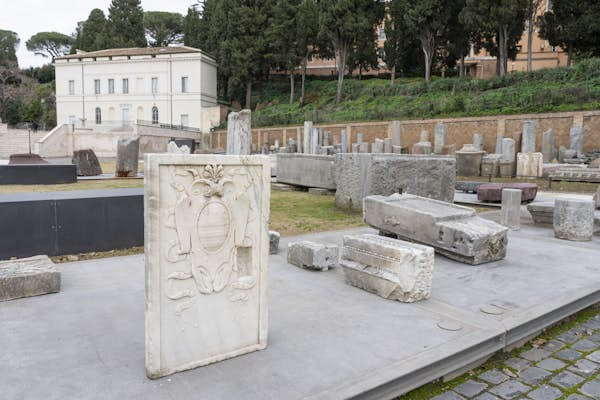History fans will want to put this new Roman museum on their itinerary
Beside the imposing Colosseum, a new archaeological park and museum have recently unveiled their treasures to eager visitors.

Beside the mighty Colosseum, a new archaeological park and museum have recently unveiled their treasures to eager visitors in Rome.
You've ticked the Colosseum from your list and gazed in wonder at the historic ruins of the Roman Forum. Wondering what's next to explore?
Step into the Archaeological Park of the Celio and the Museum of the Forma Urbis. This immersive experience allows you to go back in time and study the streetscapes, architecture and ruins of Ancient Rome.
Remaining fragments of the Forma Urbis Romae, the marble map of ancient Rome engraved between 203 and 211 AD © Stefano Montesi / Corbis / Getty ImagesMuseum of the Forma Urbis
At the heart of this experience lies the chance to walk over an original marble map of the Eternal City. The colossal marble plan, known as the Forma Urbis Romae, harks back to the reign of Emperor Septimius Severus, with engravings etched between 203 CE and 211 CE Originally displayed vertically in the Temple of Peace in the Roman Forum, this monumental map, measuring approximately 18m by 13m (59ft by 43ft), remained hidden until its rediscovery in 1562.
Today, it is meticulously preserved under glass, presented horizontally to offer visitors the sensation of strolling through the ancient streets of Rome. Giovanni Battista Nolli's 1748 Pianta Grande map of Rome is superimposed on it, bringing the map's points of interest to life.
The gigantic marble map depicts Ancient Rome engraved on 150 marble slabs © Stefano Costantino / SOPA Images / LightRocket / Getty ImagesTransparent floors invite you to walk atop the detailed ancient cobblestones, encountering iconic landmarks like the Colosseum, Ludus Magnus, and the Sacred Area of Largo Argentina. Despite only about a tenth of the map remaining intact, this marks the first public display of these fragments in nearly a century, according to the Associated Press.
The map spans 150 marble slabs, intricately depicting temples, baths, basilicas, and neighborhoods of ancient Rome. It was more symbolic than practical when created, serving as a tribute to the city's architectural magnificence – something to show off to the rest of the empire – rather than merely functioning as a conventional navigational tool.
Carved marble blocks from the Ancient Rome are lined up during the opening of the Archaeological Park of the Celio and Forma Urbis Museum © Stefano Costantino / SOPA Images / LightRocket / Getty ImagesArchaeological Park of the Celio
Simultaneously, the newly-opened Archaeological Park of the Celio houses numerous architectural relics carefully curated from 19th-century excavations. Among these remnants are the foundational remains of the Divo Claudio, also known as the Temple of Claudius, dating back to the 1st century CE. The park features various burial grounds, public monuments and sacred areas.
Italian newspaper La Repubblica notes the stone remains have been arranged thematically so that the park feels like an open-air museum. Among the ruins is a grand tomb from the 2nd century BCE, belonging to Servius Sulpicius Galba, a member of one of Rome's most powerful families. In contrast, there's a more modest story told by the gravestone of Pamphilia, who was an ornatrix or hairstylist.
Within the park's grounds, you'll also discover the Casina del Salvi, which Wanted in Rome reports is poised to reprise its original role as a coffee house for visitors.
Plan your visit
This initiative is part of a larger project aimed at enhancing Rome's historic hills. The new park and museum are integral parts of the city's New Archaeological Walk, seamlessly connecting ancient Roman sites around the Roman Forum, Colosseum, Terme di Caracalla, and Circo Massimo.
The archaeological park welcomes visitors free of charge every day. The museum opens daily, with the exception of Mondays, with tickets priced at €9 ($10).



















